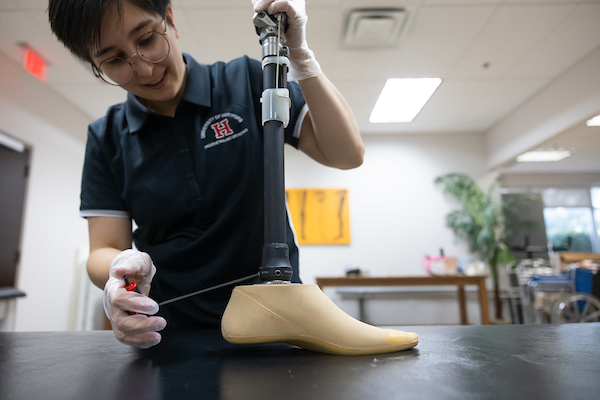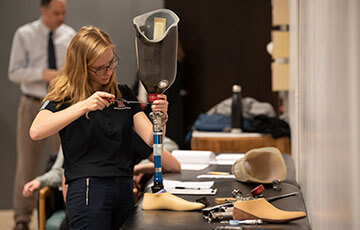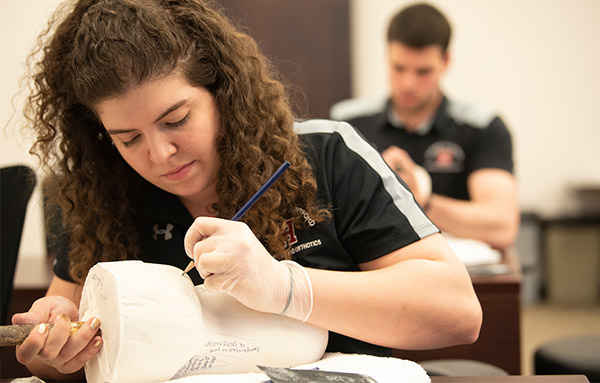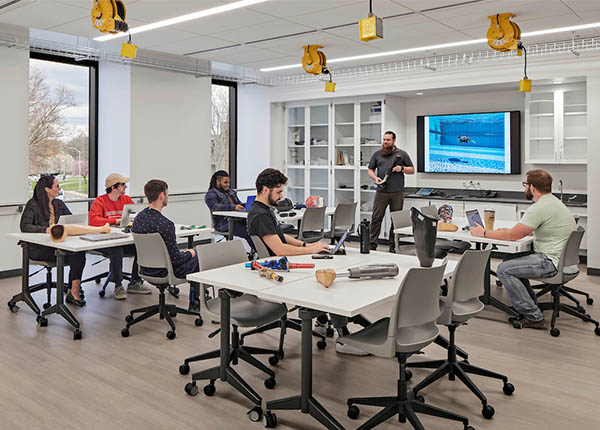About the Program

The combined BS/MSPO is a 5-year program, which enables you to start your career sooner. Students complete the requirements for the bachelor's degree and begin the professional MSPO program in the fourth year, completing the master's degree by the end of the fifth year.
Our combined BS/MSPO program prepares graduates to meet the intellectual, social, cultural, and economic challenges of our changing healthcare system. The curriculum combines a liberal arts education with a strong science core to provide the foundation for success in professional practice.
Prosthetists design, fabricate, and fit devices known as prostheses (artificial limbs) for individuals who have partial or total absence of a limb.
Orthotists design and fit devices known as orthoses (orthopedic braces) to enhance function and provide care for patients who have disabling conditions of the limbs and spine.
Want to learn more about the profession? Check out whatispop.org!

Advances in technology
New design innovations and advances in technology offer dramatic benefits to people who use prostheses or orthoses. For example, advanced prosthetic knees can be controlled by microprocessors that improve gait stability and walking pattern efficiency. Orthoses equipped with Bluetooth devices can electronically interface with nerves to enhance motor control.
The National Commission on Orthotics and Prosthetic Education (NCOPE) mandated that all prosthetics and orthotic educational programs be elevated to the master's degree level by 2012. Our currently accredited Prosthetics and Orthotics Program offered in partnership with Hanger Clinic has been licensed by the Department of Higher Education, State of Connecticut. We are one of 13 accredited MSPO programs in the United States.
Our faculty is made up of expert clinicians with advanced degrees who are committed to advancing the profession of prosthetics and orthotics and mentoring those who will become the new professionals of tomorrow. Our smaller classes allow the faculty to devote more attention to students, getting to know you personally and understand your career goals.
Program Requirements
The undergraduate portion of the combined BS/MSPO is a minimum of 122 credits. A sample of courses is listed below. For more information and to see a complete list of degree requirements, visit the Course Catalog.
Science Core Courses - 35-36 credits
Introductory Biology
Human Anatomy and Physiology
College Chemistry
Mechanics, Heat and the Body
Pre-Professional Science Courses - 33 credits
Healthcare Concepts
Introduction to Prosthetics and Orthotics
Functional Anatomy
Gross Anatomy
Kinesiology
Biomechanics
Additional Requirements - 54 credits
Psychology Courses - 13 credits
Electives - 6 credits
General Education Requirements - 35 credits
Career Outlook

Prosthetists and orthotists are in high demand, with employment expected to grow 15 percent from 2022 to 2033, according to the federal Bureau of Labor Statistics.
The Hursey Center

The Hursey Center opened in Fall 2021 and includes state-of-the-art labs and classrooms for ENHP students. Facilities include labs for motion analysis, human performance, physical therapy, prosthetics and orthotics, nursing simulation and more.
Admission
Freshman applications are reviewed on a rolling basis beginning in late September. We recommend that high school students who are interested in the Prosthetics and Orthotics program complete courses in biology, chemistry, physics, and mathematics with an A or B grade point average. Transfer students are not currently accepted into the program.
The University of Hartford implemented a test optional policy in 2018 for applicants who believe that their SAT or ACT scores are not representative of their academic achievements and potential. All students are welcome to apply as test optional and should indicate so on their application. Our test optional policy is consistent with the goal of reviewing each application for admission in a holistic manner.
Office of Admission and Financial Aid
800.947.4303
admission@hartford.edu
Tuition and Financial Aid
If you are a full-time undergraduate student applying to the combined BS in Health Science and Master of Science in Prosthetics and Orthotics Program, you will be considered for financial aid programs that the University administers. In addition to our own funds, the University of Hartford participates in all Federal Title IV Programs and Federal Family Education Loan Programs.
Residents of Connecticut and those states with reciprocal agreements with the State of Connecticut may also be eligible to receive state scholarships or grants.
The following links provide information on tuition and financial aid:
To discuss ways to finance your program of study, contact the Financial Aid Officer for the College of Education, Nursing and Health Professions:
860.768.4296
finaid@hartford.edu
Program Contact
Heather Johnson
Program Specialist
Prosthetics and Orthotics Program
860.768.5207
hejohnson@hartford.edu